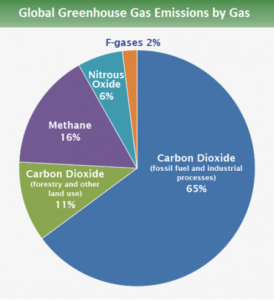
Guilt-tripping is a powerful tactic. Oftentimes in abusive relationships, the perpetrator will deceive the victim into believing they’re at fault. The public is in an abusive relationship with big corporations, and it’s time they stop guilt-tripping us.
Most people have heard the phrase “carbon footprint,” in conversations on climate change and environmentalism. The phrase popularized by British Petroleum (BP) in the early 2000s has shifted the responsibility of global emissions from corporations, onto innocent individuals who live in a world that is generally inaccessible without the use of fossil fuels.
Electricity, transportation and infrastructure are fundamental components of our existence, yet the future of our planet has been perceived to be at the expense of our lives. Doing what you can to reduce your impact on the environment is generous, but when corporations make harm unavoidable, it’s time to reassess who should be feeling guilty.
An interactive feature designed on BP’s website in 2004, allows individuals to track their carbon footprint and see how their daily routines devastate the environment. Yet, six years after the implementation of this feature on their website, BP was responsible for one of the worst oil spills in the Gulf of Mexico, impacting my hometown’s beach and surrounding ecosystems still to this day.
Research from MIT Researchers confirm that even those living moderate lifestyles can’t help but negatively impact the environment.
“For a homeless person who ate in soup kitchens and slept in homeless shelters in the U.S. that destitute individual will still indirectly emit some 8.5 tons of carbon dioxide each year,” MIT Researchers said.

According to the United States Environmental Protection Agency, electricity and heat production are most responsible for global greenhouse gas emissions. If anything, the public should be guilt-tripping top companies such as Chevron and Aramco into using sustainable sources of energy such as solar, wind and wave rather than coal and fossil fuel. General education on the benefits of using solar energy to power homes for instance is limited, perpetuating the belief that solar powered homes are a mere dream of the future, and financially impossible.
According to the World Resources Institute, China, the European Union and the United States are the top three world contributors of greenhouse emissions. And although China may be the world’s biggest polluter, per capita the United States is third and China is 12th. Our overuse of coal and fossil fuels is costing the world population and health of our planet, yet fingers are pointed at you and me instead of greedy corporations and negligent politicians who refuse to join initiatives to preserve what we have left.
The propaganda and PR campaigns created to make us feel culpable for the current state of our planet, has for sure worked. Cutting down on single-use plastic, recycling and even using metal straws have been ways for us to feel a sense of collectivism in the fight for sustainability. But even if every person on the planet implemented those savvy lifestyle changes, we would still be on a steady path of irreversible climate change and ultimately global destruction.
Looking at the state of our nation plagued with wildfires, earthquakes and hurricanes can make you feel minuscule and powerless. Although much is out of our control, one thing remains true: it’s time we return the energy big corporations are giving us, and demand they make pragmatic changes for the sake of us all.